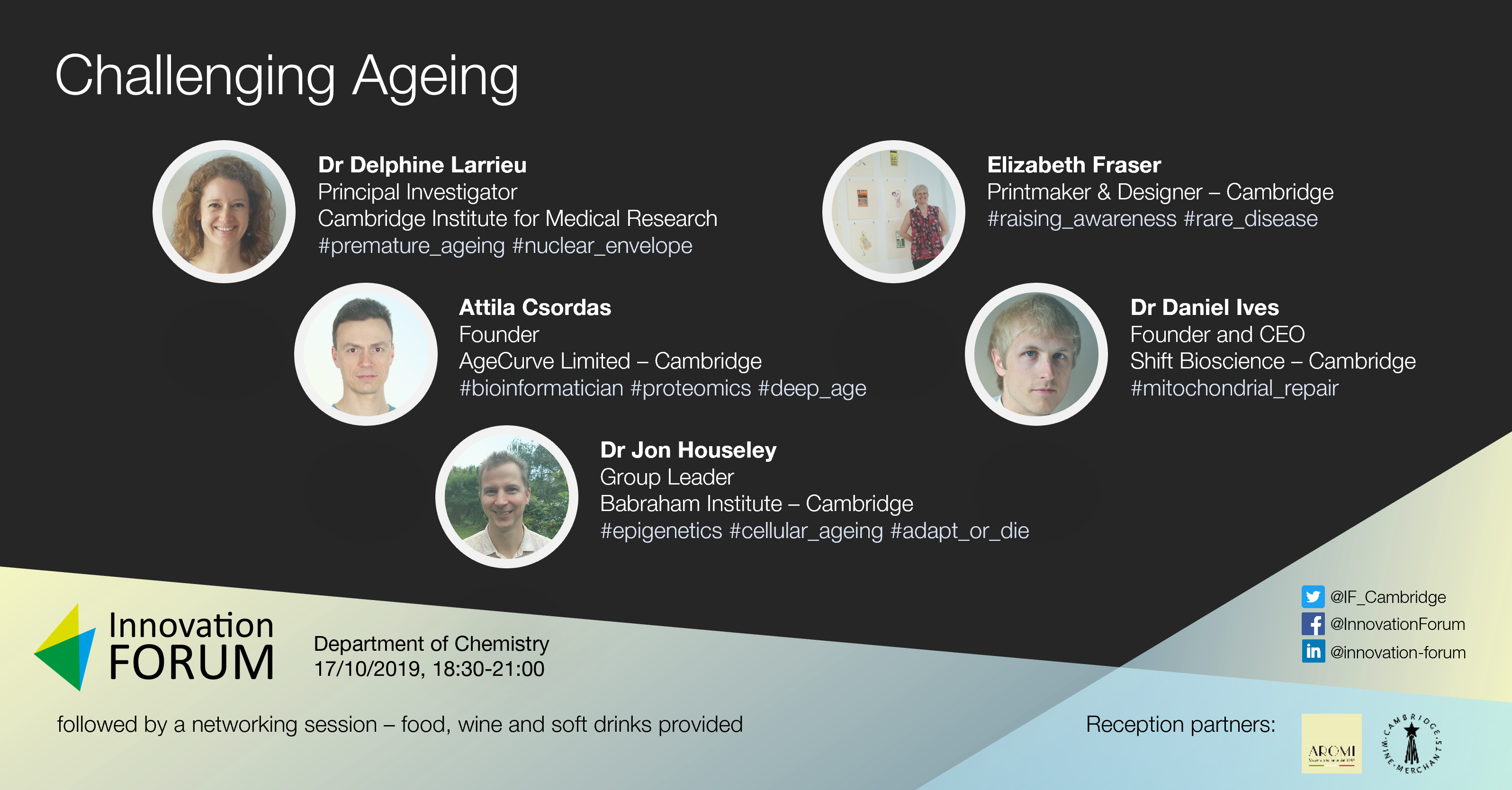Branch
Select your branch
Challenging Ageing
Saturday, October 19th 2019
18:30 – 21:30 (GMT)
Do you want to attend? Get your ticket!
Register NowDescription
Since the dawn of time, ageing has been viewed as an inevitable fate, with conditions like cancer and dementia becoming more common as we get older. A growing number of scientists are questioning this common assumption. What if ageing was just another curable disease? Would there be ways to extend our lifespan from today thanks to a handful of well-targeted cellular processes and ageing biomarkers? Would premature ageing syndromes be curable? What is your biological age telling about yourselves? Are you older or younger than you think you are?
We have gathered a panel of speakers who will tackle these questions, share their expertise and discuss the latest developments that will enable and optimise opportunities for healthier ageing. The talks will be followed by a networking session where food, wine and soft drinks will be served (a joint service from Aromi and Cambridge Wine Merchants).
Venue:
Department of Chemistry
17/10/2019, 18:30-21:00
The Innovation Forum Cambridge team is looking forward to welcoming you for this talk.
Speakers
Cells must express the correct genes to the correct level to thrive in any given environment. Jon's group has recently proposed that what we now know as ageing started as an process by which cells adapt to changing environments. By studying the epigenetic and genetic changes in ageing cells, his group aims at elucidating the underlying drivers and control mechanisms of cellular ageing. Our preliminary data suggests that ageing even in simple unicellular eukaryotes is a far more complex process than currently believed, encompassing a mixture of regulated and unavoidable changes. Detangling this mixture of pathways is a critical aim, and understanding how the individual pathways can be modulated by diet and drugs is of particular interest.
Jon developed an interest in RNA biology during his PhD research in Glasgow on the pathogenic effects of RNA in the inherited disease Myotonic Dystrophy. His post-doctoral research in the Tollervey lab in Edinburgh started in the biochemistry of RNA degradation, but moved steadily back towards genome alteration with studies on the roles of non-coding RNA in controlling the stability of repetitive DNA. In 2009 Jon started a Wellcome Trust-funded research group at the Babraham Institute studying non-coding RNA biology and copy number variation.
Attila Csordas picked the problem of ageing and the corresponding project of healthy longevity as his exclusive professional motivation at the age of 14. After starting out as a mitochondrial and stem cell researcher, Attila turned his attention to proteomics and has been working as a proteomics bioinformatician for the past 9 years. During these years he acquired hands-on experience in dealing with ever more complex proteomics datasets. Attila founded AgeCurve Limited in Cambridge UK, the first ever start-up using direct-to-consumer personal proteomics to provide deep age profiles to end users based on a saliva sample. Besides the default DTC offering, AgeCurve has already started to work with clinicians and biomedical researchers in order to find a way to contribute to longevity medicine.
Delphine's goal is to understand the cellular mechanisms behind premature ageing syndromes and other nuclear envelope associated diseases and to identify new ways to tackle these. Delphine completed her Master's degree in Integrative and Cell Biology at the University of California, Irvine (UCI) and at the University of Grenoble, France. She then carried out her PhD in the Remy Pedeux Laboratory at the Institute for Advanced Biosciences in Grenoble, working on tumour suppressor genes and their involvement in DNA replication and repair. She then undertook her postdoctoral research in the Steve Jackson Laboratory at the University of Cambridge Gurdon Institute, with personal funding from EMBO and from the Medical Research Council (MRC). During her time as a postdoc, Delphine developed a strong interest in understanding nuclear envelope function and its links with disease, more specifically premature ageing. Upon being awarded a Wellcome Trust Sir Henry Dale fellowship, Delphine Larrieu set up her own lab at the Cambridge Institute for Medical Research to pursue her research in the field of nuclear envelope.
Daniel Ives is CEO and founder of Shift Bioscience, a preclinical drug discovery and development company developing the first small molecule drug for safe repair of mitochondria, the energy producing organelle. Daniel was a mitochondrial researcher for 7 years (2009-2016), based first at the MRC Mitochondrial Biology Unit and later at the Crick Institute. Daniel discovered small molecules that restore mitochondrial function by reducing the level of pathogenic mitochondrial genomes. The technology provides a powerful approach (pun intended) to combatting aging, diseases of ageing and mitochondrial orphan diseases. Daniel gained his PhD from the University of Cambridge.
Elizabeth is a printmaker working mainly with handset metal type and linocutting. She is inspired by the invisible connections and structures that verbal and written language make in our lives. By playing with the material visualisation of language she explores its role in the communication of place, memory and time. Elizabeth has recently worked with Dr Delphine Larrieu to raise awareness on premature ageing.
Request sponsorship opportunities package
Sponsor this event






